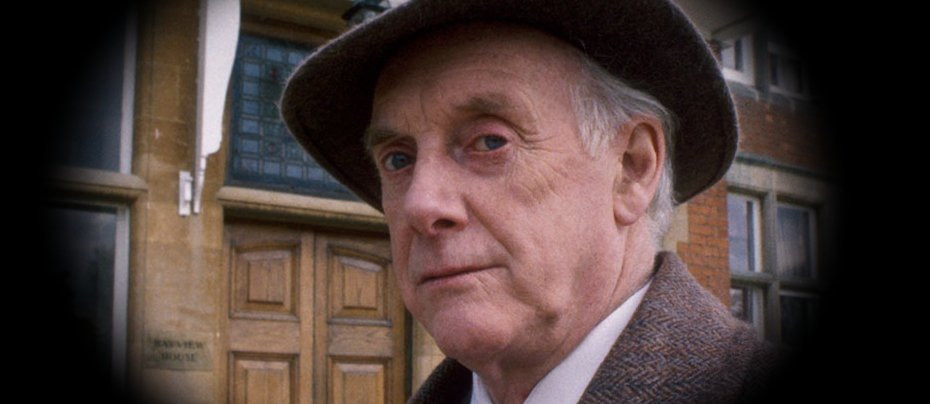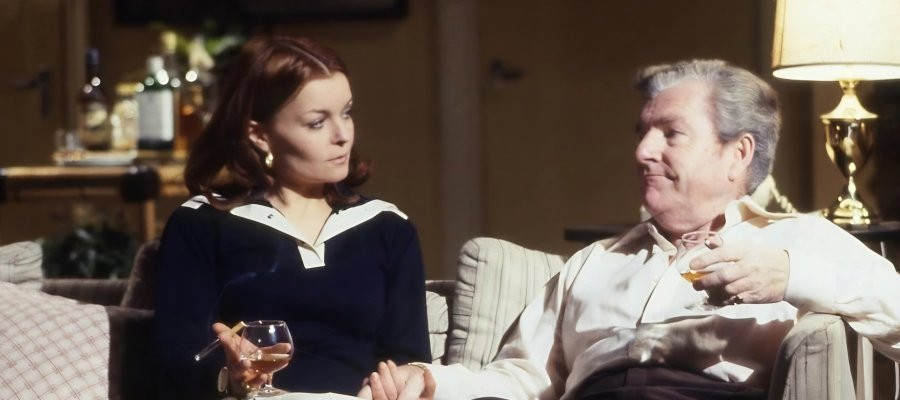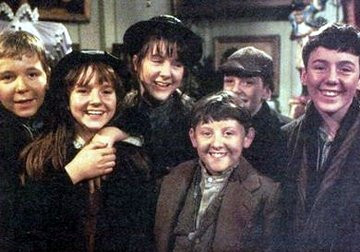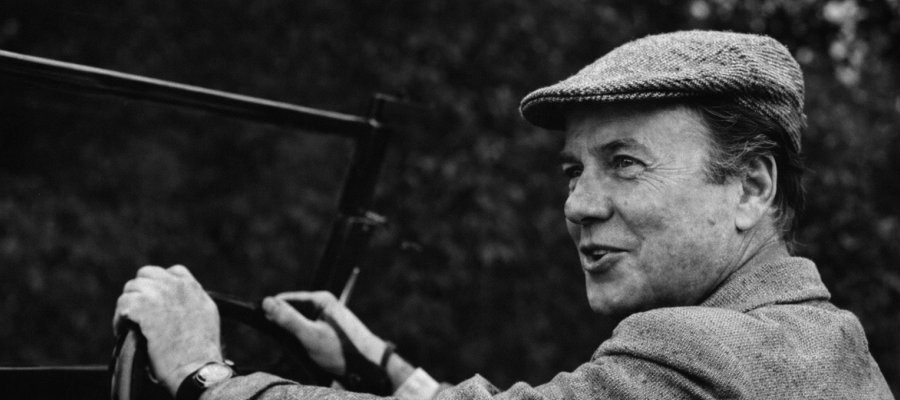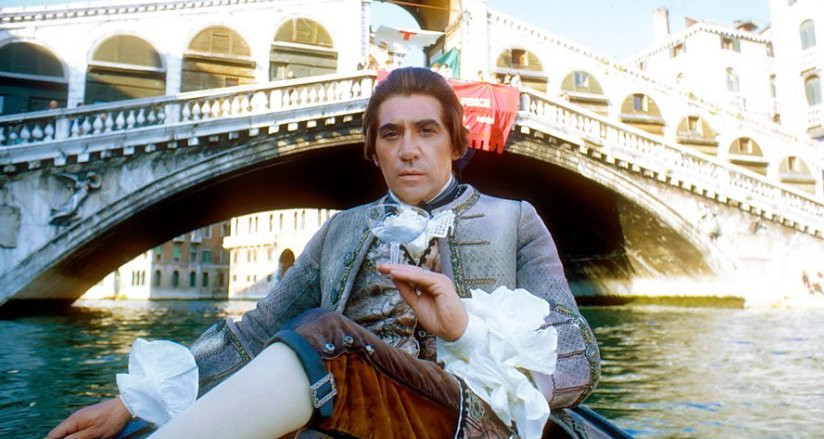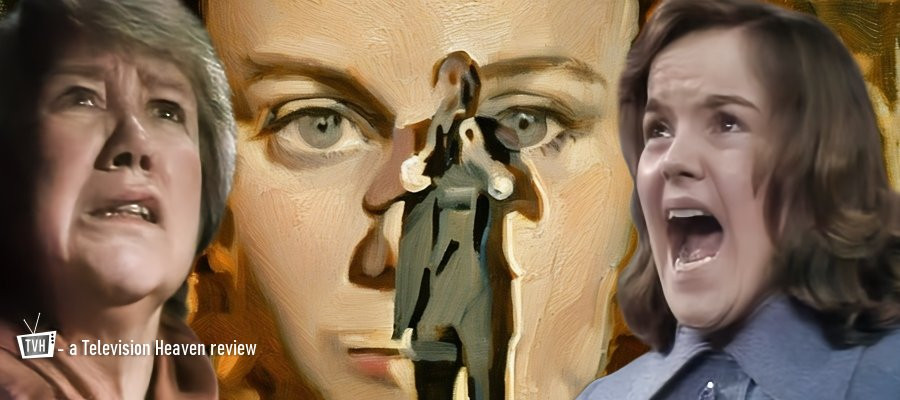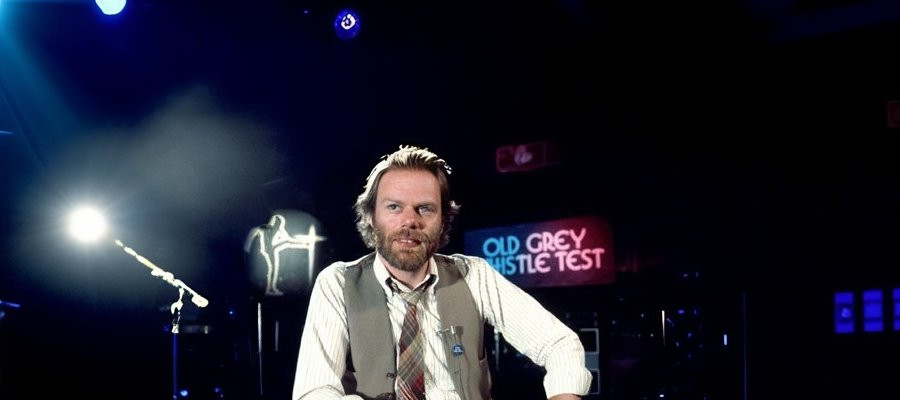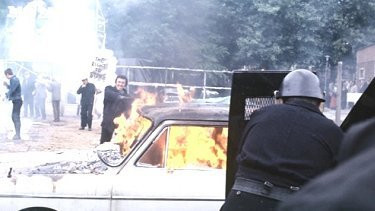
The Guardians
1971 - United KingdomCo-created by Rex Firkin and Vincent Tilsley, The Guardians was one of the first drama series to get its hands dirty with the soiled laundry of the political and social fall-out of the late 1960s. The UK emerged, somewhat dazed, from the hedonism of that period to face mass unemployment, industrial unrest and galloping inflation. Tilsley and Firkin clearly wanted to produce a drama that examined these issues, morally and philosophically, suggesting a very radical and dystopian alternative to the national crisis the public and their politicians were dealing with.
At the heart of the drama is the notion that the UK is actually run by a private police force, headed by the mysterious General. Whilst the idea of private police being the arbiters of law and order might seem a bit fanciful, the intertwining of private and public policing has a long history in the UK and even as recent as November 2009 concerns have been raised again about how many private security firms are actually being paid to patrol the inner cities. The titular Guardians here represent the instrument of power, appearing as a morally dubious fascist force. The Independent Television Authority was so concerned about the political content of the series and a potential misunderstanding between the depiction of the series' sinister uniformed paramilitary force called "The Guardians of the Realm" (known for short as "The Guardians" or simply "The G's") in relation to the name of the police force of the Republic of Ireland Garda Síochána (which translates into English as “Guardians of the Peace”) that the series was refused transmission in Northern Ireland.
One can safely say that nothing is presented in purely black and white terms in The Guardians and the concerns it raises are patiently examined from a multiplicity of viewpoints. The series is, in effect, an attempt to fictionalise the lengthy discussions of the day. Each episode becomes a moral debate over various issues such as the constitution, European federalism, capital punishment, political assassination, democracy and criminality. It's an extremely brave call and would probably be virtually impossible to stage now. The problem is that, fascinating as the various political and social debates are, there is a tendency to sacrifice drama and plot to service them. You end up with a stream of episodes that do move extremely slowly because many of the characters tend to sit down and spend a good chunk of their time batting philosophical arguments back and forth over a scotch and soda.
It's astonishing to think that this was broadcast to a mainstream audience by London Weekend on a Saturday night. But then unrest was in the air and the series was reflecting back some of the concerns in the backs of viewers minds. Wilson had just been ousted by Heath and in 1967 Wilson himself was seen as pro-Communist to such a degree that Peter Wright of MI5 became involved with Cecil King, the publisher of the Daily Mirror in a plot to bring down Wilson's government and replace it by a coalition led by Lord Mountbatten. Tilsley and Firkin have swept away the monarchy in The Guardians but those in power are wrestling with opposition from Communists and a fragmented collection of resistance groups collectively known as Quarmby. The Quarmbies continue to force the state to become increasingly oppressive in the belief that it will be forced to reveal its true nature to the population. A major theme of the series is concerned with how far the resistance should adopt the tactics of their oppressors in order to replace them and whether their fragile alliance can withstand internal conflicts and disagreements.
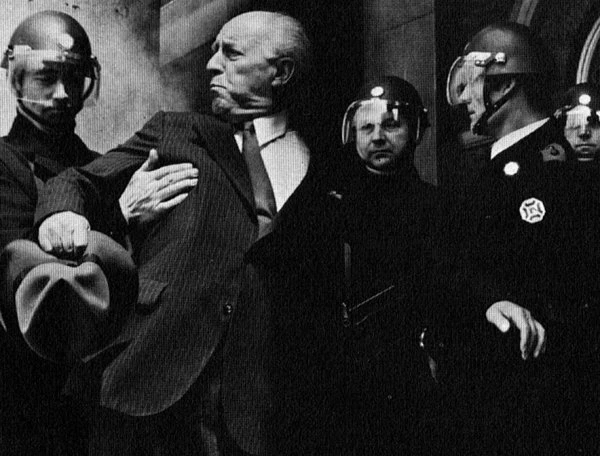
Whilst it bristles with Orwellian overtones, the repressive regime of the future Britain is not portrayed as an army of totalitarian robots. They are seen to be pricked by their consciences, are racked with guilt and doubt. Their actions are not without appalling consequences. We see Prime Minister Timothy Hobson struggling to be more than just a figurehead in thrall to the General's military junta, jostling for power and influence in a head to head battle of wills with the General's quisling Cabinet Secretary Norman. It's an interesting journey that he makes to the status of benevolent dictator.
The opening episodes 'This Is England' and 'Pursuit' certainly don't make any concessions to the viewer with the series' overall plot - the cat and mouse game between Hobson's government, the General's state police force and the Quarmbies - often held up by fireside discussions on the morality of the politics depicted in the show. These scenes are very talky and are often very long so you could be forgiven for bailing out of this early. Those episodes are important because they not only introduce Hobson and Norman but also major characters such as Clare Weston (the rather excellent Gwyneth Powell), the wife of Captain Tom Weston in the Guardian force, and a state supported psychiatrist Benedict.
The drama is as much about their own morality and political affiliations as they get caught up in changing events. What does let these first episodes down is the lack of budget to satisfactorily depict the Guardians dealing with a group of protesters who aren't particularly well directed in some of the filmed sequences. It often veers between effective newsreel verisimilitude and The Two Ronnies satire 'The Worm That Turned'.
Hobson's struggle to be more than a figurehead and to demonstrate he's perfectly capable of running a government is depicted in Head Of State. The first episode where Firkin and Tilsley seem to get to grips with their format, this sets up the battle of wills between Hobson and Norman whilst also examining the complexities of constitutional law and Hobson's attempt to dismantle the state police. This episode also introduces Christopher Hobson (Edward Petherbridge), the Prime Minister's son, who becomes involved with Clare Weston after her husband has gone missing, presumed killed. The Logical Approach depicts the state's use of capital punishment, using an allegedly 'humane' method where prisoners are sedated without their knowledge and executed with lethal injections whilst a dramatised hanging is presented to satisfy public bloodlust.
In Quarmby, we discover that Benedict, the state psychiatrist (an early television role for David Burke), is one of the Quarmbies and his wife inadvertently threatens to blow his cover when she has him followed by rather useless private detective, looking for evidence for divorce proceedings, played quite brilliantly by David Cook. It's a bizarre episode and takes a rather chilling turn when Benedict is forced to strangle the detective, who is disguised as a woman, in front of his wife in order to keep his dissident identity safe.
Later, we learn that the government keeps its political prisoners passive by the use of cannabis in 'rehabilitation' centres and by 'End In Dust', the series conclusion, Clare finds out that her husband is not dead but has been kept in one of the centres. Norman is also closing in on Benedict and making his moves on Hobson too. There is a head to head discussion in the final episode that quite frighteningly echoes the current apathy with politics in the UK and in the week of Blair's appearance at the Iraq War Inquiry makes the series horribly prescient.
As Benedict argues, "The logic of resistance is to provoke the government into violent and tyrannical acts, to brutalise it. Because if that goes far enough the majority of the people will turn against it".
Norman thinks the logic is poor, faulty and replies "The majority of any population will always be apathetic if a government is prepared to use every modern means of manipulating opinion and repressing opposition it can continue to function without any popular backing at all."
Benedict's hope is that Hobson can see the logic "I believe the time would come when you would see the brutalisation had begun and could only get worse. I believe that when that time came you'd say to yourself, 'what I'm doing is worse that what I came into power to cure' and that you'd then reverse your policies and return..."
"To democracy?" offers Hobson. It all leads to a pessimistically downbeat ending.
Tilsley's influence can clearly be seen, echoing his work and ideas seen, for example, in The Prisoner, and many of the themes here would also crop up in Kubrick's A Clockwork Orange released in January 1972, about two months after the series had been transmitted. Both works seem to be picking up on the social complexities and cultural contradictions of the 1970s that can be traced to one preeminent reality – the postwar world of abundance and optimism had ended. … It was a new world, full of frightening uncertainties. Many of the series themes would also later be reworked in Wilfred Greatorex's under-rated 1990 series for BBC starring Edward Woodward.
If you have the willingness to listen to long but intelligent debates about various shades of totalitarian politics and the ethics of violent resistance you'll find much to think about but be prepared for the long haul because the series does not rely on action to tell the stories and character development is often quite slow. Performances are pretty good, the best certainly coming from Cyril Luckham, an absolute tour de force as Hobson, and from Derek Smith, chillingly evil as Norman. Look out for cameos from the likes of Graham Crowden, Peter Barkworth, Michael Culver, Anthony Bate and Dinsdale Landen.
Interesting but definitely an acquired taste.
Seen this show? How do you rate it?
Seen this show? How do you rate it?
Published on December 19th, 2018. Written by Frank Collins for Television Heaven.


